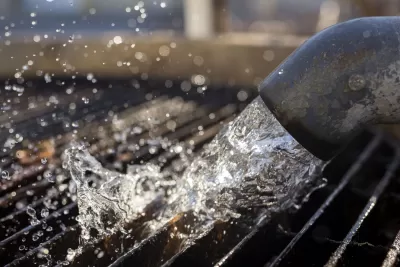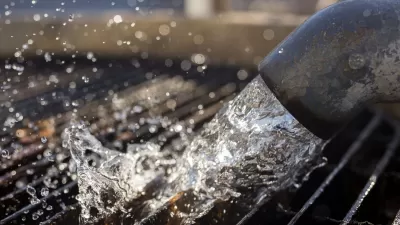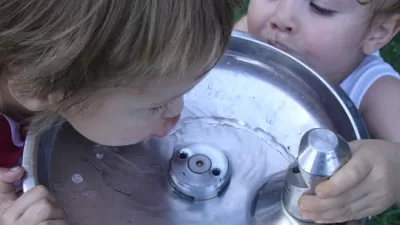The ambitious Pure Water project is designed to reduce the city's dependence on imported water and limit the amount of sewage dumped into the ocean.

After "a lengthy process featuring thorny lawsuits, complex labor deals and an aggressive public education campaign to fight the derogatory early nickname 'toilet to tap,'" San Diego has launched its biggest-ever infrastructure project, "a sewage recycling system that will boost local water independence in the face of more severe droughts caused by climate change." As David Garrick reports, "this fall will mark the start of construction on the system’s three most essential projects," "a $356 million sewage purification plant in western Miramar, a $123 million pipeline through much of Clairemont that will bring sewage to that plant, and a $110 million Morena Boulevard pump station to make that possible."
In response to protests by local residents who worry about disruptions to their neighborhoods, the city "created special 'working groups' to keep residents up to speed on activity." The project, named Pure Water, "will produce 34 million gallons per day of potable drinking water. A larger second phase, slated for completion in 2035, will add another 53 million gallons," reducing San Diego's imported water from 85 percent to under 50 percent.
"In addition to making San Diego’s economy less vulnerable to droughts and sharp cost increases for imported water, the project also will sharply reduce the amount of sewage the Point Loma Wastewater Treatment Plant emits into the ocean," an important selling point since the city faced "constant pressure from federal officials to spend billions upgrading the Point Loma plant to meet the standards of the Clean Water Act."
The project is also expected to provide 4,800 jobs through "a union-friendly Project Labor Agreement," the first in the city's history.
Los Angeles, Orange County, and other local governments across California are implementing their own water recycling projects in a bid to reduce Southern California's water imports and boost the state's water security as it prepares for intensifying climate change and deeper drought.
FULL STORY: San Diego launching Pure Water, largest infrastructure project in city’s history

Alabama: Trump Terminates Settlements for Black Communities Harmed By Raw Sewage
Trump deemed the landmark civil rights agreement “illegal DEI and environmental justice policy.”

Planetizen Federal Action Tracker
A weekly monitor of how Trump’s orders and actions are impacting planners and planning in America.

The 120 Year Old Tiny Home Villages That Sheltered San Francisco’s Earthquake Refugees
More than a century ago, San Francisco mobilized to house thousands of residents displaced by the 1906 earthquake. Could their strategy offer a model for the present?

In Both Crashes and Crime, Public Transportation is Far Safer than Driving
Contrary to popular assumptions, public transportation has far lower crash and crime rates than automobile travel. For safer communities, improve and encourage transit travel.

Report: Zoning Reforms Should Complement Nashville’s Ambitious Transit Plan
Without reform, restrictive zoning codes will limit the impact of the city’s planned transit expansion and could exclude some of the residents who depend on transit the most.

Judge Orders Release of Frozen IRA, IIJA Funding
The decision is a victory for environmental groups who charged that freezing funds for critical infrastructure and disaster response programs caused “real and irreparable harm” to communities.
Urban Design for Planners 1: Software Tools
This six-course series explores essential urban design concepts using open source software and equips planners with the tools they need to participate fully in the urban design process.
Planning for Universal Design
Learn the tools for implementing Universal Design in planning regulations.
Clanton & Associates, Inc.
Jessamine County Fiscal Court
Institute for Housing and Urban Development Studies (IHS)
City of Grandview
Harvard GSD Executive Education
Toledo-Lucas County Plan Commissions
Salt Lake City
NYU Wagner Graduate School of Public Service




























